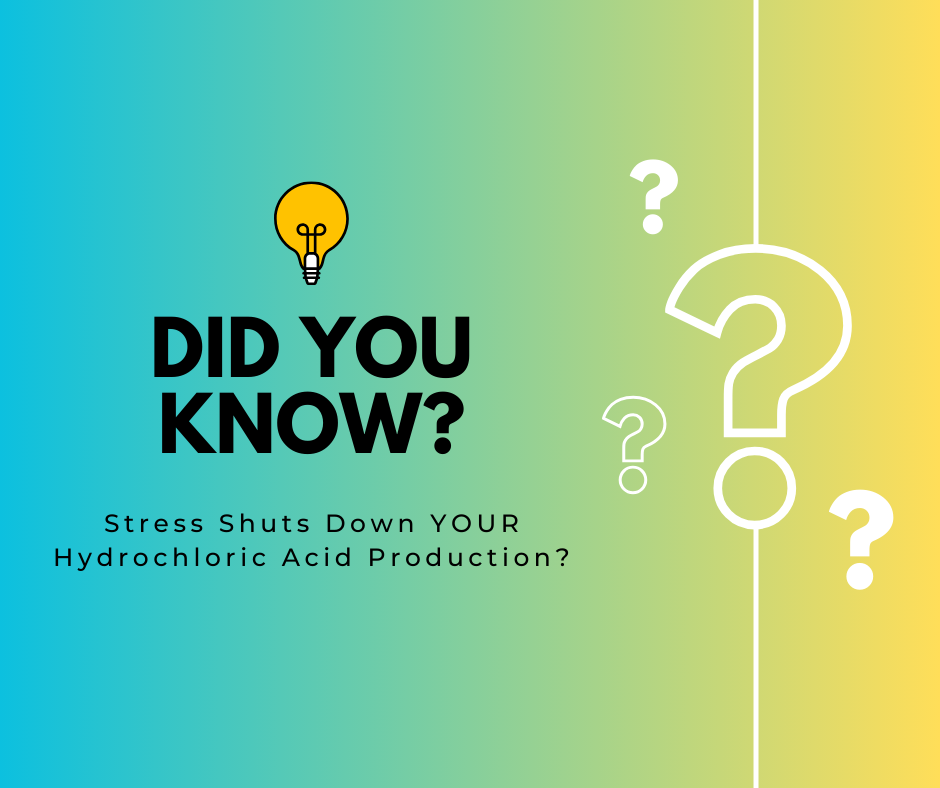When we encounter stress—whether it’s physical, emotional, or psychological—our bodies activate the sympathetic nervous system, triggering the well-known “fight or flight” response.
This response prioritizes survival mechanisms, like increasing heart rate and diverting blood flow to the muscles, while shutting down non-essential functions like digestion. On the flip side, digestion operates optimally under the parasympathetic nervous system—the “rest and digest” mode.
How Stress Shuts Down Hydrochloric Acid Production?
Here’s what happens during chronic stress and its effects on HCl production:
Reduced Blood Flow to the Stomach
Under stress, blood is diverted away from the digestive organs to support muscles and other critical systems. This reduces the energy and resources available for the stomach to produce HCl.
Suppression of Gastric Secretions
Stress hormones like cortisol and adrenaline inhibit the production of gastric juices, including hydrochloric acid. This is a survival mechanism—your body assumes digesting food isn’t a priority when you’re in danger.
Weakened Vagus Nerve Activity
The vagus nerve, which controls stomach acid production and other digestive functions, is less active during stress. Reduced vagal tone leads to lower HCl production and overall poor digestion.
Delayed Gastric Emptying
Stress can slow down the movement of food through the stomach, causing indigestion, bloating, and reflux. With insufficient HCl, the stomach struggles to process food efficiently.
Increased Risk of H. pylori Infection
Low stomach acid creates a less acidic environment, allowing harmful bacteria like Helicobacter pylori to thrive, potentially leading to ulcers and other gastrointestinal problems.
The Consequences of Low Stomach Acid
When hydrochloric acid production is suppressed due to stress, a cascade of digestive problems can occur:
Acid Reflux (GERD): Paradoxically, low stomach acid can cause acid reflux. Without enough acid, the stomach struggles to digest food, leading to pressure that pushes acid into the esophagus.
Bloating and Gas: Poorly digested food ferments in the stomach, producing excess gas and bloating.
Nutrient Deficiencies: Low HCl impairs the absorption of essential vitamins and minerals, leading to fatigue, weak immunity, and brittle nails or hair.
Leaky Gut Syndrome: Improperly digested proteins can irritate the intestinal lining, contributing to increased intestinal permeability.
Chronic Gut Dysbiosis: An imbalanced gut microbiome can result from undigested food and insufficient acid to kill harmful bacteria.
How to Support Hydrochloric Acid Production During Stress
Manage Stress Levels
- Practice mindfulness techniques like deep breathing, yoga, or meditation to activate the parasympathetic “rest and digest” mode.
- Prioritize adequate sleep to regulate cortisol levels.
Eat Mindfully
- Chew your food thoroughly to stimulate the digestive process.
- Avoid eating on the go or during high-stress situations.
Incorporate Digestive Aids
- Use natural aids like apple cider vinegar or lemon water before meals to support acid production.
- Digestive bitters can stimulate stomach acid and enzyme secretion.
Supplement if Necessary
- Betaine HCl with pepsin can help improve stomach acid levels, especially for those with confirmed low acid. Consult a healthcare professional before starting.
Support the Vagus Nerve
- Gargling, humming, or practicing deep breathing can improve vagal tone, enhancing digestion.
Opt for Nutrient-Dense Foods
- Include foods rich in zinc, B vitamins, and magnesium, as these nutrients are crucial for HCl production.
The Role of Homeopathy in Stress and Digestion
Homeopathy offers gentle and individualized solutions to address both stress and its impact on digestion. Remedies such as:
- Nux Vomica: For stress-induced bloating, indigestion, and heartburn, especially after rich foods or stimulants like coffee.
- Ignatia: For digestive issues caused by emotional stress, grief, or anxiety.
- Lycopodium: For bloating, gas, and low appetite due to weak digestion.
- Carbo Veg: For heaviness and bloating with belching and a lack of digestive strength.
Chronic stress doesn’t just affect your mind—it can have a profound impact on your stomach, particularly by shutting down hydrochloric acid production. Without adequate HCl, digestion falters, leading to a host of health issues. By managing stress, eating mindfully, and using natural supports like homeopathy and digestive aids, you can restore balance to your digestive system and improve your overall health.
Remember: Your gut health reflects your overall well-being, so take time to nourish both your body and mind.
Would you like personalized guidance on improving your digestive health with homeopathy? Reach out for a consultation today!





